Global Akhanda Bhajan begins tomorrow…
Friday, November 9th, 2012
Annual Global Akhanda Bhajan, the spiritual exercise initiated by Bhagawan, for Peace Unto All The Worlds, will commence tomorrow, Saturday, 10 November evening at 1800 hrs. in Prasanthi Nilayam. The 24- hour Spiritual Exercise will culminate on the day after, 11 November, evening at 1800 hrs. with Mangala Arathi.
sourced:
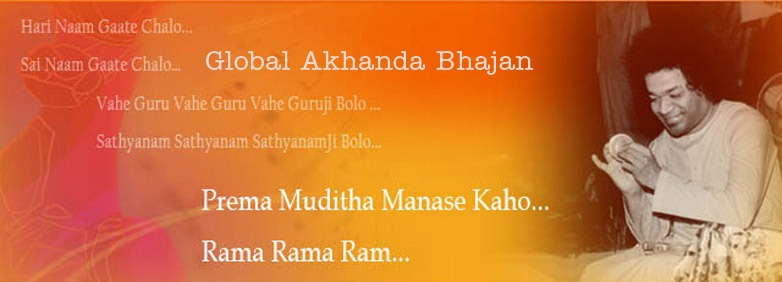
Global Akhanda Bhajan
Friday, November 9th, 2012
“You too must pass your days in song. Let your whole life be a bhajan. Believe that God is everywhere at all times, and derive strength, comfort and joy by singing His Glory in His Presence. Let melody and harmony surge up from your hearts and let all take delight in the Love that you express through that song.” said Bhagawan in an exclusive Divine Discourse delivered on 14th Nov 1976 on the occasion of Global Akhanda Bhajan.
Of all the Sai programmes for promoting Harmony and Unity among the peoples of the world nothing is so significant and far‑reaching as the observance of “Akhanda Bhajan “on a global scale, initiated by Bhagawan. It represents a unique attempt at making people in every part of the world conscious of their Divine essence and to experience the sense of oneness spiritually. The Akhanda Bhajan, which is observed by Sathya Sai Centres in all countries, from Tokyo in Japan to Vancouver in Canada, from Fiji in the Pacific to Trinidad in the Caribbean, has become over the years one of the most looked‑for event in the Prasanthi calendar.
A simple exercise started over a quarter century ago by a great devotee of Bhagawan, Dr. R.S. Padmanabhan at his Bangalore residence, enthused by His greater inner prompting, has become a global phenomenon, when devotees from the fraternity opt to sing bhajans for a marathon 24-hour, invoking Universal Peace.
Akhanda Bhajan involves constant contemplation on God in the morning, evening or even during the night time. It is constant contemplation on God during all the three states – the waking, dream and deep sleep. It is “Sarvada Sarvakaleshu Sarvathra Harichintanam, said Bhagawan long ago, explaining the significance of the marathon spiritually elevating saga.
…And Akhanda Bhajans of yester years used to have Bhagawan’s greater participation. Reminiscing the beauty and subtlety of the marathon Bhajan Saga, one of the former students of Bhagawan’s University, who has been blessed by Bhagawan to sing in His presence writes:
“Akhanda Bhajan was about to begin in a few minutes. Bhagawan entered the bhajan hall from the rear side and was slowly walking on the carpet towards the altar where He had to light the “Akhanda Jyothi” to mark the commencement of the Bhajans. As He reached the altar, He noticed a glittering artificial garland placed around the neck of the Hanuman Idol by the side of His chair. One could see a frown on His face as He went close to the Idol, bent over the lamp placed by its side, removed the garland and dropped the same saying ARTIFICIAL. We all know that every act of Bhagawan has an inner meaning. We felt that Bhagawan was indirectly teaching us to sing Bhajans from the Heart and not as an Art. He says, whatever we do should be “Heartificial” and not Artificial.”
As Prasanthi and the devotees world-over gear up for the Akhanda Bhajan 2012 we have an illuminating Divine Discourse delivered by Bhagawan on the occasion of Global Akhanda Bhajan 1976. Read on.
SHRAVANAM (hearing the Glory of the Lord), Keerthanam (singing the name and Glow of God), Vishnosmaranam (allowing the mind to dwell on that Glow), Paadhasevanam (adoring the Feet of the Lord), Vandhanam (experiencing gratitude and joy at His Grace), Dhaasyam (feeling oneself as His instrument), Sakhyam (awareness of his being one’s constant and closest companion) and Aathmanivedhanam (dedicating one’s full being to Him)—these are the nine steps In the path of Devotion.
“Listen, O people! Revel in this iron Kaliyuga, for there is none so propitious for liberation such that mere remembrance of the Name of the Lord and adoring Him thus are enough to win His Grace and set you free.”
“This is bad, this is good—can such judgements ever be made about anything in God’s creation when all are manifestations of His Will.”
Samkeerthan is manifestation of inner ecstasy
Embodiments of the Pure Aathman!
Last November, on the 23rd, people from all parts of the world had assembled here to celebrate the Golden Jubilee and office-bearers of the centres were here for the Second World Conference and other functions that took place. Later they expressed their desire that they be allotted a date before the close of the jubilee Year, when they in their own places could celebrate the happy occasion. In order to overcome their disappointment it was decided that in all centres all over the world, bhajan and naama-sankeerthan (congregational singing and spirituals) be held for full twenty four hours, beginning at 6-30 p.m. on Saturday (yesterday) and ending at 6-30 p.m. today. Therefore in 42 countries around the globe more than 7,000 centres have enthusiastically taken up this pleasant assignment.
This has been named an akhanda-bhajan, that is to say, bhajan done without a break. But was it really an akhanda-bhajan? It is begun at 6-30 on the evening of one day, and is closed at 6-30 on the evening of the next day. Can we call it ‘unbroken’ bhajan? What is a period of 24 hours when we consider the vastness of the Universe and the eternity of time? it is just a wink, a minute part of the life of man on earth. By engaging yourselves in the recitation of the Name of God for one single day, you claim to have done bhajan “without a break!” Akhanda-bhajan must be as continuous as breathing itself if it is to deserve its name.
You must probe into the real significance of the samkeerthan that you are engaged in. Keerthan is “singing aloud the Glory of God.” Samkeerthan is the process of singing that originates in the heart, not from the lips or tongue. It is the expression of the joyous thrill that wells up from the heart when the Glory of God is remembered. It is the spontaneous manifestation of inner ecstasy. No attention is paid to the blame or praise that others may give. It does not seek the admiration or the appreciation of the listeners. It is sung for one’s own joy, one’s own satisfaction, one’s own delight. Keerthan of this supreme type, alone, deserves the name samkeerthan.
Naamasamkeerthan can cleanse the atmosphere
Singing this intense yearning for God and enjoying the experience of adoring Him, helps to purify the atmosphere. Man is today forced to breathe the air polluted by sounds that denote violence, hatred, cruelty and wickedness. Therefore he is fast losing the high attainments that are in store for him. The vibrations of the naamasamkeerthans (heart-felt recitation and Lord’s name) can cleanse the atmosphere and render it pure, calm and ennobling. It is with this high purpose in view that this programme of global samkeerthan was designed.
No man can escape the influence of the pollution of the air he breathes. The sounds that we produce, with good intent or bad, spread throughout the air around us. This is our daily experience. The sounds produced at radio stations pass through the atmosphere and reach our homes when we tune in. The vibrations travel vast distances and affect the nature of those who inhale them. The atmosphere affects also the food man consumes. The pollution in the atmosphere is imbibed by the plants, the plants supply the grain, the grain is the basis of the meal and the meal shapes the character and behaviour of the person who consumes It. When the environment is clean and free from evil vibrations, the. food too, is pure, and the person develops a tendency to be loving and simple. It is to ensure such an atmosphere that this saadhana (spiritual effort) initiated the world over.
Prayer should come shrieking through the heart
When a man falls Into a well, of what use is it if he controls his voice and his emotions and whispers quietly, “I have fallen into this well, I have fallen into this well. I am in great danger. Please save me?” No one will be able to hear or save him. He must shout full-throated, with all the anguish he is experiencing and with the extreme desire to be’ saved, “I HAVE FALLEN INTO THE WELL! SAVE ME! SAVE ME SOME ONE!” Then can he hope to get succour.
Similarly, when you are caught in the coils of this world, when you have fallen Into this deep well of worldly misery, shout with all your might, with all your heart, that you may be saved by God. There is no use muttering faintly and half-heartedly, “Save me, save me; I am floundering in this samsaar (worldy life).” When the prayer comes shrieking through the heart, help is assured. Samkeerthan or bhajan is of four types. Guna-samkeerthan, leela-samkeerthan, bhavasamkeerthan,and naama-samkeerthan, guna means ‘attributes’ (of God). So guna-samkeerthan is the adoration, in song, of the manifold Attributes of God—Omnipresence, Omniscience, Compassion, Majesty, etc. Leela means ‘divine sport.’ Therefore leela-samkeerthan is the adoration, in song, of the various expressions of these attributes as evidenced by the accounts of sages and seers of all faiths. Bhaava means ‘attitude’ (of the mind). So bhaava-samkeerthan means the adoration, in song, of God pictured and contacted under various relationships.
Path of devotion is the most effective Sadhana
Some may prefer to adore Him as the Giver of equanimity (shaantham), others as a Friend, Guide and Guardian (sakhya), still others as the child one loves and tends (vaathsalya) and yet others as the lover whom one loves with sovereign love (madhura). Naama means the Name of God, and so naama-sankeerthan means the adoration of God, calling upon Him by various Names, each describing His glory, His achievements, His relationship with the individual.
The Names are many, or even countless; it is so in all languages. We have many groups of ‘thousand and eight Names’ which can be used, for God, as the Vedhas (ancient revealed sacred scriptures) declare, has a ‘thousand heads, a thousand eyes and a thousand feet.’ Devotees can adore Him and derive bliss through that adoration, filling each Name with the meaning and significance it carries.
By whatever means God is adored, the path of devotion is the easiest and the most effective for it is a saadhana of the heart, and results in love and service to all as fellow pilgrims to the same Divine Goal.
Some people do question the propriety of calling God by means of such a multiplicity of names. But each Name is indicative only of one aspect of Divinity. It denotes a single part of the Supreme Personality. The eye, the nose, the mouth, the hand or the finger may be denoted by distinct words, but they all belong to the same individual. So, too, one must remember that every Name is but a facet, a part, a ray, of the Supreme. The saadhana consists in recognising and becoming aware of the One that supports and sustains the many. That is the precious gem of wisdom that one must secure and treasure.
Let Liberation be your only desire
There is, however, a thief that lurks in the inner consciousness of man, planning to rob him of this gem. He is kaama (desire). When we have gained what we desire, lobha (greed}, the accomplice of the thief, steps out and prods us to desire a few more objects. When what is desired is not gained, another accomplice, krodha (anger), steps out and prods us to hate and harm those whom we suspect. stood in the way of the gain.
Of course you cannot instantly eliminate all desire from the mind. So you should nourish the one desire prescribed by’ the Vedhas. The Vedhas lay down four goals before man: dharma (righteousness), artha (wealth), kaama (desire) and moksha (liberation). Since the first and the last are difficult to attain without detachment and deprivation of sensual pleasures, man has given them up as impracticable and is struggling in all lands and climes with the middle two— wealth and desire. All the fear and misery of life can be traced to this dire mistake. What has to be done is to take the four as two inseparable pairs, Dharma-artha and kaama-moksha. That is to say, earn wealth through righteousness and use wealth for the promotion of righteousness. And let liberation be your only desire.
Words have a profound effect on the mind
Liberation means getting rid of bondage. Many people give up hearth and home, wife and children, property and possessions, and escaping into forest retreats pride themselves on their ‘renunciation.’ But this act of fleeing cannot be honoured by that name, for such an act by itself cannot confer release, when the mind still remains bound. The fundamental bond which has to be got rid of Is the bond of ajnaana (primal ignorance). Death is sweeter than the bondage that Ignorance can impose on man. Cast away ignorance- you are free, liberated from all bonds that very moment. All spiritual disciplines have this liberation as their goal. Naamasamkeerthan (Heart-felt singing of divine names) too, helps you get rid of this basic ignorance.
Those who rely on reason alone or on the limited laws of science, argue that the repetition of the Name which is, after all, sound, cannot cleanse or correct the mind of man. But the Name is not just ‘sound.’ You are sitting quietly there, listening, but if someone merely says, ‘scorpion,’ you get frightened. Or when someone says, the juice of a lemon, your mouth starts watering. You may be sitting before a plateful of delicacies, but if someone speaks of something dirty or disgusting, you are apt to refuse the food. The mere sound creates so much of reaction:
A certain officer was inspecting the work of a teacher in a school. He had a hearty contempt for mere talk, so he asked the teacher, “How can you ever transform the nature of these children by the words you utter? Show them by deeds; act, don’t speak.” The teacher protested and argued that words have a profound effect on the mind. The argument continued for some time. At last the teacher resolved upon a plan to convince the officer of his point of view. He told an urchin of his class, “Here! Catch this officer by the neck and push him out of the room.” Hearing those words, the officer flew into a great rage and started pouring abuse on the teacher. The teacher said, “-Sir, I only said a few words. No one pushed you or hit you or touched you. It was all mere sound. But see how it has enraged you. Words, sir, do help in modifying character and shaping nature. They have vast power,” he said.
Do not seek to discover the evil in others
When words referring to worldly situations have such a transforming effect on the mind of man, words conveying spiritual and elevated meaning will certainly help in cleansing and correcting the mind of man. When we fill the air with harshness, we become harsh in nature. When we fill the atmosphere with hatred we, too, have perforce to breathe the air, and are hated in turn. When we saturate the air with sounds full of reverence, humility, love, courage, self-confidence and tolerance, we benefit from those qualities ourselves. The heart is the film and the mind is the lens; turn the lens towards the world and worldly pictures will fall on the heart. Turn it towards God, and it will transmit pictures of the Divine.
Therefore always do good, see good, remember good and be good. Do not seek to discover or discuss the evil in others for the attempt will tarnish your own mind. When you are engaged in searching for the faults and failings of others, you are paving the way for developing those faults and failings in yourself. Dwell on the good in others, and in time it will prove an asset to you.The goodness latent in you shall then be urged to sprout and blossom.
Every thought leaves an impression on the mind
When you pray. “Swaami, appear in my dream tonight,” there is a chance that you may be lucky to visualise Swaami in your dream. But if you pray, turning your attention to bad things, “Swaami, let not a pig or an ass appear in my dream this night,” in all likelihood, the pig and theass will present themselves to you in your dream. Why pay undue attention to things you do not need and do not benefit from? Every thought leaves an impression on the mind, so be ever alert that contact with evil is avoided.
Ideas which are opposed to spiritual tendencies, that narrow the limits of love, that provoke anger or greed, that cause disgust—these have to be shut out. For the saadhaka this is a very essential discipline. He must sublimate such thoughts before they cause an impact on the mind, and should concentrate on the very source of the thinking process. This can be achieved by the practice of equanimity, unaffectedhess or balance. This attitude is the mark of the jnaani (liberated person) and is called jnaana-shakthi (the power of wisdom). Of course it is not easily acquired. The path of devotion and dedication—the bhakthi-maarga—is easiest for most. It is attainable by love, for love leads you quickly to the Goal.
God responds to prayer that emanates from the heart
Once upon a time, Naamadheva (noted for his mastery of the bhakthi-maarga through constant recital of the Name) and Jnaanadheva (noted for his mastery of the path of wisdom), were together crossing a thick jungle. They were both afflicted with severe thirst but could not find water anywhere in spite of a tiresome search. At last they came upon a ruined well with a little water far down its depths, but they had no means of going down the steep sides. So Jnaanadheva used his power and transformed himself into a bird. The bird flew down and drank its fill, only to change itself into Jnaanadheva again! Naamadheva relied upon the power of the Name. He sat on the edge of the well and called, ‘Naaraayana,’ in great anguish. God responded to his prayer. The water rose up to where he sat and he could gather it in his palms and quench his thirst. He had no need to embody himself anew and disembody himself again for the satisfaction of a physical thirst.
When God is invoked by prayer that emanates from the heart, let it be but once, He responds immediately. But now the call emanates only from the lips, it has not the ring of sincerity and faith. From the lips, it must roll back on the tongue: from the tongue, it must go deep into the throat; from the throat, it must reach down into the heart. Continuous saadhana alone can grant success in this endeavour. You must become like an Infant with no inhibitions or stratagems. The mother may be attending to her daily chores on the first floor of the house, leaving the infant in the cradle on the ground floor. But when the child sends up a loud wail, either through fear or hunger, she rushes down to lift the child, fondle it, feed it and comfort it on her lap. She will not stay away because of the wall not being musical or melodious.
Man’s life has become pathetically artificial
Similarly, the Mother of the Universe. will not weigh the quantity of yoga (divine communion) that you have practised, or calculate the number of Japams (repetition of sacred formulae) you have rolled on the rosary, or the time taken by you for saadhanas of various kinds. She can be moved and Her Grace can be won by a genuine appeal emanating from the heart. Man is finding it increasingly difficult to call upon the Supreme Source of power and grace with such genuineness. His life has become pathetically artificial.
Kaamadhenu (the wish-fulfilling heavenly cow, can be drawn and tied to a post by means of a rope. God, too, can be drawn towards you by the rope (the Name), and tied to the post (the tongue). Then His Name will be dancing upon the tongue forever, conferring the sweetness of His Majesty. The Name has to be sung for your own delight, to quench your own thirst, to appease your own hunger. No one eats to appease another’s hunger, nor takes drugs to alleviate another’s illness. So do not care for what others feel about your dhyaana (meditation) or bhajan.
Do not seek the approval, appreciation or admiration of others, or refrain from dhyaana or bhajan because others dislike it or ridicule it. Be self-reliant, self-confident. See through your own eyes; hear through your own ears. Most people today believe their ears and deny their eyes; or they use the eyes, ears and even the brains of others and thus fall into error and fear.
You are shaped by the company you keep
Consider this : Here you do bhajans twice a day, but bhojans (meals) are taken four times a day! Physical exercises are resorted to in order to make the body strong and fit. Dhaanya (grain, cereal) is grown and stored and used to strengthen the body; dhyaana (meditation) is equally necessary for strengthening the mind so that in its weak state it may not yield to the viruses of lust, greed, anger, hatred, pride, etc. If the body is well-developed and the head is weak, it is a case fit for the lunatic asylum. Food should be for both body and head, and both these should be dedicated to the Realisation of God, the Truth behind and beyond all truths.
Seeking good company and spending all available time in that comradeship called sathsang (holy company), will help the aspirant a great deal. You are shaped by the company you keep; a piece of iron turns into rust if it seeks the company of the soil. It glows, it softens and takes on useful shapes if it enjoys the company of fire. Dust can fly if it chooses the wind as its friend; it has to end as slime in a pit if it prefers water. It has neither wing nor foot, yet it can either fly or walk, rise or fall, according to the friend it selects.
Knowing this truth, Kabir, the great mystic-poet, sang, “Here are my prostrations to the bad. Here are my prostrations to the good.” When asked why he offered prostrations to the bad along with the good, he replied, “I prostrate before the bad so that they might leave me alone; I do the same before the good, so that they might remain near me always.”
By the power of Sadhana, man becomes Divine
Here is a burning coal; here, at some distance, is a cold piece of coal. When they contact each other, the heat spreads to the cold piece of coal, and the part that is in contact with the burning coal is rendered hot and red. If you vigorously sway a fan over the contact area, soon the entire coal becomes a burning ember. ‘Near,’ alone, is not enough for realisation; one has to make it ‘dear’ by the fan of saadhana. This is the power of saadhana, by which the human becomes Divine. The Vedhas say that he who knows Brahman, becomes Brahman. The coal knew fire and became fire. Saadhana is the cultivation of prema (love). Be full of love, taste the exhilaration that love can confer. Man is love embodied: he thirsts for love and he finds real joy in 1ovlng and receiving selfless love. You have forgotten your real nature, which is love, and so you exude misery, hate and jealousy. Never be morose or melancholic. Let all see you exuberant with love and light and joy. Do not entertain passion or prejudice, anger or anxiety. Take the saadhana of the Name, the naamasankeerthan, and the path will be smooth.
This programme of bhajan continuously done for 24 hours all round the world in all lands, has therefore and spread the message of love through the Names of Embodiment of Universal love. It has saturated the atmosphere with thoughts of God and of the peace and joy that He showers.
The bhajan that you have done here has affected not only this particular area and its environment, but it will transmute the entire atmosphere. Continue this attitude of devotion and humility, of service and tolerance, and the atmosphere will not be polluted by hatred. Do not contaminate the air by voices of acrimony, scandal, insult or slander. Keep silent when you feel like expressing such ideas; that itself is a service to you and to others.
Life is a song, sing it. That is what Krishna taught through His life. Arjuna heard that song on the battlefield, where tensions were at their highest and when the fate of millions was to be decided by the sword. Krishna sang the Geetha for Arjuna to listen. Geetha means ‘song,’ and He sang because He was Aanandha (Divine Bliss), wherever he might be—in Gokulam, on the banks of the Yamuna or at Kurukshethra between the warring armies.
You too must pass your days in song. Let your whole life be a bhajan. Believe that God is everywhere at all times, and derive strength, comfort and joy by singing His Glory in His Presence.
Let melody and harmony surge up from your hearts and let all take delight in the Love that you express through that song.
sourced:
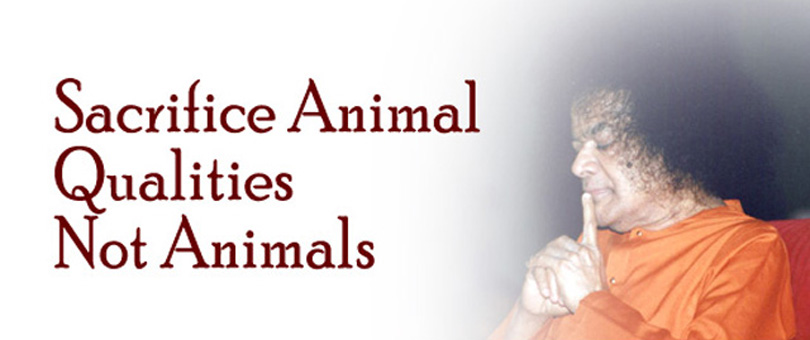
Sacrifice Animal Qualities, Not Animals…
Friday, November 9th, 2012
Living in a progressive modern world, man is still to evolve justifying his status, among creation, bestowed upon him by the Creator. Unaware of the gross sin being committed man , even today, is a slave to his passion for flavour of flesh appeasing his taste buds. If we do not rein in our intent, posthate, it would be bit too late, comments Sri Jullie Chaudhuri writing on all that Bhagawan has taught us about Care for life, Concern for Nature and Respect/Reverence for all of Creation.
How do we know Beloved Bhagawan loves us…?
When He fills our hearts and blesses us,
With wondrous values that enhance and bring to the fore,
Supreme Love and so much more…
…Compassion…and that feeling of Amity,
And Empathy,
Latent within each one of us already…
And, how does God ‘know’ that we really do love Him…?
When we let this love, compassion, harmony,
Care, sympathy and empathy,
Develop and crystallize in to a feeling of Oneness,
A feeling of Equality for all, nothing less,
That does none forsake…
Enveloping all life forms in its wake…
When He fills our hearts and blesses us,
With wondrous values that enhance and bring to the fore,
Supreme Love and so much more…
…Compassion…and that feeling of Amity,
And Empathy,
Latent within each one of us already…
And, how does God ‘know’ that we really do love Him…?
When we let this love, compassion, harmony,
Care, sympathy and empathy,
Develop and crystallize in to a feeling of Oneness,
A feeling of Equality for all, nothing less,
That does none forsake…
Enveloping all life forms in its wake…
Compassion towards all creatures is the greatest virtue. Wilful injury to any creature is the worst vice. Have full faith in this: Spread love and joy through compassion, and be full of joy and peace yourself! – Baba
Dear Sisters and Brothers, Care for life, Concern for Nature and Respect/Reverence for all of Creation…is what forms the fulcrum of what you are about to peruse at this moment.

Certain procedures were required in a certain period of time, certain examples were set pertaining to prevailing circumstances…seeming appropriate to the sequence of events as well as the consequences thereof…however, now that we have voyaged along different ages through the womb of time, we must keep abreast of things, giving due respect to tradition, we must adapt the practice of customs, so as not to damage, hurt, destroy, cause pain or suffering to any sentient being. Reverence for all life forms should be the dharma of all those belonging to the human race. For individual growth as well as collective expansion of consciousness, Ahimsa, which stems from and is an offshoot of pure and selfless love, must become a way of life…lest humanity suffers an irrevocable setback.
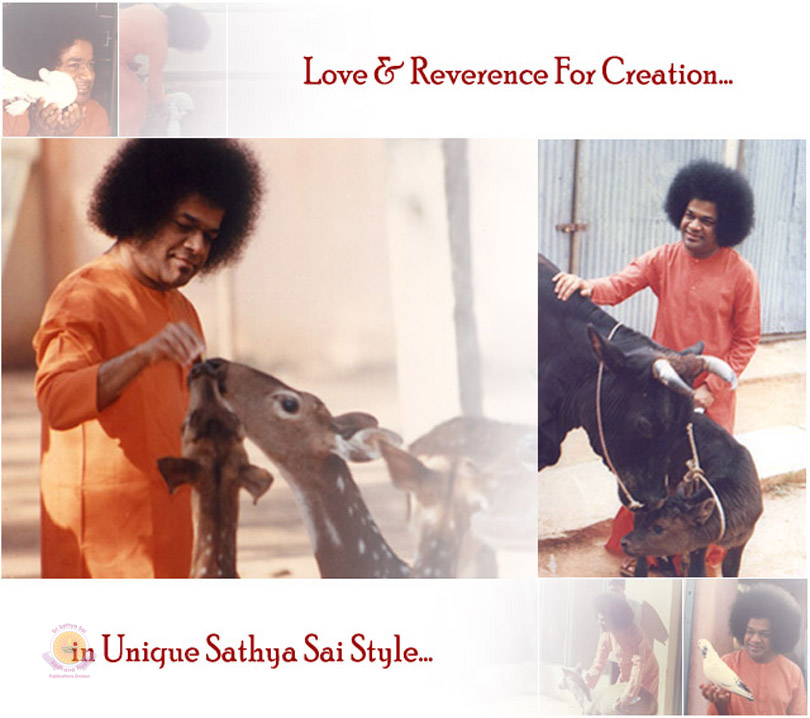
The Paramartha of those ancient days is turned into Pamarartha of these days! (Paramartha means the highest goal; Pamarartha means the fool’s goal). Thus, each one of the ancient practices, once full of meaning, has grown wild beyond recognition. Branches have shot out in various directions. It is not now possible to pluck the tree by the roots and plant a new one. So, the existing tree has to be trimmed and trained to grow straight. The highest goal has to be constantly remembered, and not diluted into the lowest. - Baba
Festivals are a time of gaiety, merriment and joy; sharing, caring and giving. Then, how can we celebrate when another being is suffering right before our eyes, when our ears can hear their cries…? Any occasion is a cause for true celebration only when goodwill is expressed for all beings in the Universe…when the positive energies released, touches the soul of all creatures, both great and small. After causing harm, injury, fatal blow to any section of creation, how can we sit back, relax…express joy…frolic and enjoy any event…? Isn’t it akin to merrymaking…having a spree of revelry…a jamboree…a carnival…in a cemetery…or a cremation ground? Are we so taken up with our taste buds…so enamoured of the flavour of flesh, that we must resort to the slaughter of another living being…? Why take a life when we can fill our stomachs without doing so…? What authority do we have to sacrifice that which does not belong to us and we have no claim over…?
“It is My duty to convey to you the truth as it exists. Today the reason why the human population is increasing is because of the attitude of the people. For man to eke out his living to fill the small tummy of his, God has created plenty in the world. He has created a large amount of rice, a large amount of fruit, a large amount of wheat. While such good food has been created by God, yet we go and eat meat and fish. And all the fish which we kill and eat are reborn as human beings.” – Baba
“It is My duty to convey to you the truth as it exists. Today the reason why the human population is increasing is because of the attitude of the people. For man to eke out his living to fill the small tummy of his, God has created plenty in the world. He has created a large amount of rice, a large amount of fruit, a large amount of wheat. While such good food has been created by God, yet we go and eat meat and fish. And all the fish which we kill and eat are reborn as human beings.” – Baba
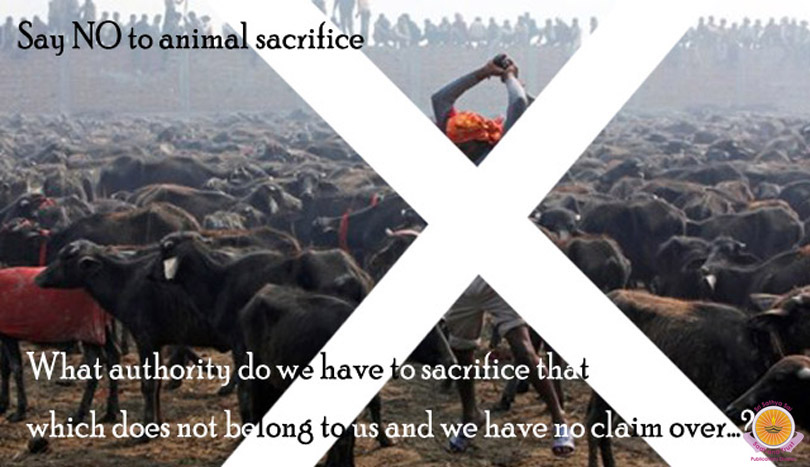
How can we expect to enhance our life by taking/retracting/obliterating the gift of life…bestowed upon any sampling of creation…? Life is the foremost benediction from the Supreme Source…and life, in turn, bestows each being with love…when you love…is it possible to take a life…? What is required by each one of us is to respect this gift of life…this precious boon of life…in ourselves…as well as in all that’s around us…every moment of each day.
Violence in any form is evil and to kill innocent animals is tantamount to blatant savagery. – Baba
Without exception, every atom in the Cosmos is here with Divine consent…
…each ray of the Sun is alive and vibrant…
…every bit upon the planet is living and breathing with Celestial Assent…
…then what of animals and birds, my dear friends…?
All are living out a life as they were meant to,
Except we humans…me and you,
…who are hell-bent,
On creating a scenario of disharmony and torment…
If we do not posthaste rein in our intent,
In response to the Divine Advent,
An expansion of love and amity augment,
It might just be a little too late to lament…
Without exception, every atom in the Cosmos is here with Divine consent…
…each ray of the Sun is alive and vibrant…
…every bit upon the planet is living and breathing with Celestial Assent…
…then what of animals and birds, my dear friends…?
All are living out a life as they were meant to,
Except we humans…me and you,
…who are hell-bent,
On creating a scenario of disharmony and torment…
If we do not posthaste rein in our intent,
In response to the Divine Advent,
An expansion of love and amity augment,
It might just be a little too late to lament…
Life is a bounty granted by the Creator…the gift of life determines what you are…karmas decide who you are…grace and blessings decide where you travel…your determination decides what you make of your life…your discrimination decides where you reach…your accomplishment of duties decide whether you are worthy and true…your devotion decides whether you have the ability to bring out the Divine in you and all that is around you…
“Love is present not only in human beings but also in all creatures, birds and beasts. Nor is that all. It is in fact all-pervasive. Love pervades everything in creation. Man’s humanness is vitiated when he fails to recognize this love.” – Sathya Sai Baba
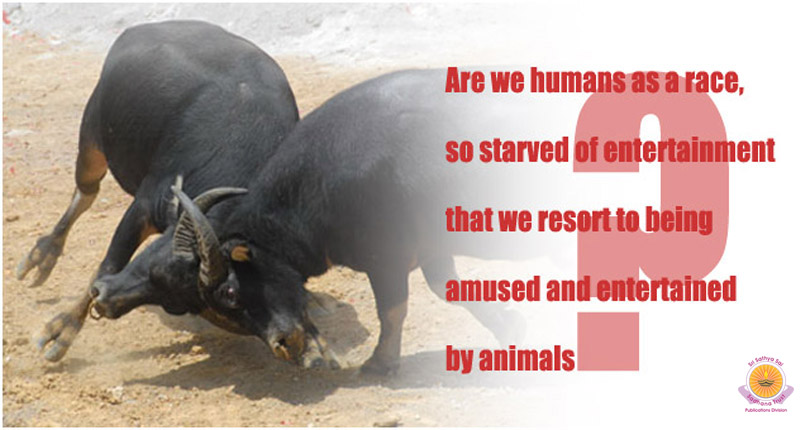
How can there be any gain…
…when we are the cause of another being,
Writhing in pain…?
Are we humans as a race, so starved of entertainment that we resort to being amused and entertained by animals all the while, vis a vis – circuses, cock fights, bullock cart races, grey hound races, snake and mongoose fights…to name but a few such ‘sports’. What is so sporting about a bull fight…goading the bull to fight…when in reality it has no such desire nor harbours any intention to seek a human out for combat…?
Has the human intellect been relegated to the deep freeze…?
What about slaughter of animals and animal sacrifice…?
Is it so easy to exonerate ourselves of all our sins by forfeiting the life of another being…?
Doesn’t that tantamount to yet another sin…?
How can we absolve ourselves of one sin by committing another…?
Is the human heart made out of some kind of metal..that man can stand and watch…withstand…the obvious agony of another being…the tremendous fear that precedes its slaughter…?
…when we are the cause of another being,
Writhing in pain…?
Are we humans as a race, so starved of entertainment that we resort to being amused and entertained by animals all the while, vis a vis – circuses, cock fights, bullock cart races, grey hound races, snake and mongoose fights…to name but a few such ‘sports’. What is so sporting about a bull fight…goading the bull to fight…when in reality it has no such desire nor harbours any intention to seek a human out for combat…?
Has the human intellect been relegated to the deep freeze…?
What about slaughter of animals and animal sacrifice…?
Is it so easy to exonerate ourselves of all our sins by forfeiting the life of another being…?
Doesn’t that tantamount to yet another sin…?
How can we absolve ourselves of one sin by committing another…?
Is the human heart made out of some kind of metal..that man can stand and watch…withstand…the obvious agony of another being…the tremendous fear that precedes its slaughter…?
“The sages used to perform Yagnas and Yagas for gaining mastery over their senses. The real nature and meaning of a Yagna is the overcoming of all our evil tendencies, throwing them into the fire of sacrifice. This is described as ‘Bhootabali’. The word Bhootabali has been misinterpreted and some people think it means ‘animal sacrifice’ and this has given rise to evil practices. This, is not the right way.” – Baba
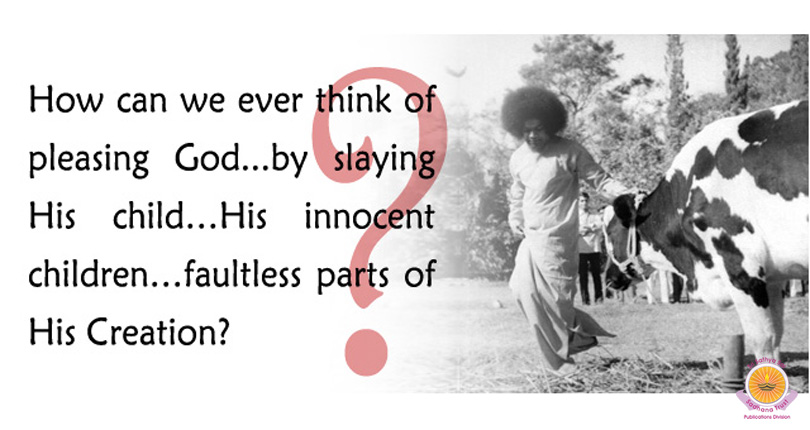
Moreover, do we truly believe that God will be pleased with this act…? How can we ever think of pleasing God…by slaying His child…His innocent children…faultless parts of His Creation?
The word ‘creation’ is just so vast…as immense and monumental…as our Creator is Eternal and Infinite…All ‘creatures’, along with human beings form a part of creation…if at all we are placed on the top rung of the Cosmic ladder, it is because the onus is on the human race to crown humanity by looking to the welfare of all created beings, inclusive of flora, fauna and the elements five…making optimum use of the sixth element – love. “Creation contains five elements. However, man has asixth element in him, which is Supreme Love.” – Baba
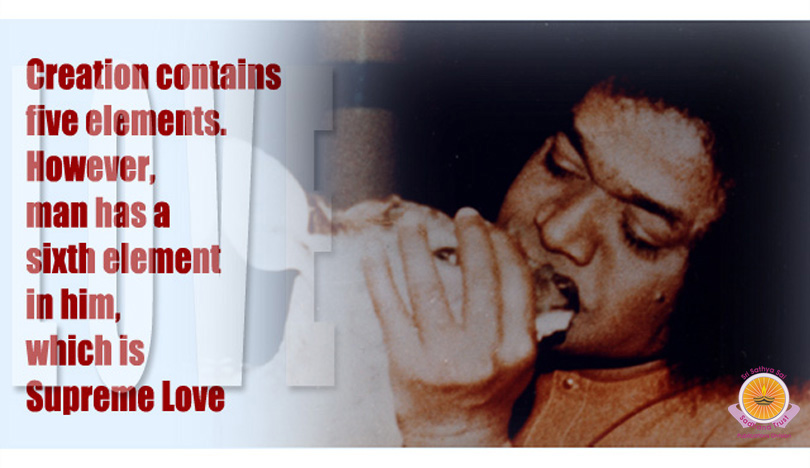
Apart from the four aspects that animals and human beings have in common – hunger, sleep, fear, reproduction…humankind has been blessed with an intellect…the power of reasoning, to be so utilised to enforce an enlightened way of living that has harmony as its base.
“The Upanishadic declaration, “Kaarunyam Paramam Tapah” means - Compassion towards all beings is real spiritual discipline. Man is the crown of creation; he is the highest amongst living beings. Therefore, he bears great responsibility. He has to love other living beings, serve them and save them, for they are his kith and kin and they too have the Divine Principle as their core. – Baba
“Ahimsa Paramo Dharmah.” – Lord Buddha. Defying ancient practices, proclaiming that – Non-violence is the greatest dharma, Buddha’s mission was to stop animal killings.
When you kill an animal you give him suffering, pain, harm. God is in every creature, so how can you give such pain? Sometimes when someone beats a dog…he cries, he feels so much pain. How much more pain then is there in killing? Animals did not come for the purpose of supplying food to human beings. They came to work out their own life in the world. When a human being is dead, the foxes and other animals may eat the flesh, but we have not come to provide food for those that eat the human body; we have not come for that purpose. Similarly, man eats the animal, but the animal has not come to provide man with food.- Baba
About sacrifice and the offering of sacrifices, sacrificial animals think quite differently from those who look on; but they have never been allowed to have their say.
- Friedrich Nietzsche
- Friedrich Nietzsche
What is required of each one of us is to sacrifice all negative traits…characteristics and mannerisms, that emit and spew poisonous fumes and red hot lava that can hurt, harm, damage, mutilate, sweep away and bury not only those they are aimed at…but other innocent beings that come in their way…going on to cause destruction and havoc in the environment too. Children imbibe insensitivity and turn into unconcerned callous adults, perhaps giving in to violence, when they watch family members rear the animals that are ultimately going to be sacrificed. They are allowed to witness the gruesome act of slaughter…resulting in their tender psyche being exposed to a harsh, unmerciful act, while absorbing an impactful experience, which perhaps strengthens the false belief – that it is alright to take a life…to hurt, wound, maim, betray and kill another being after looking to its needs over a period of time.
How sinful is it to feed on animals, which are sustained by the same 5 elements as human beings! This leads to demonic tendencies, besides committing the sin of inflicting cruelty on animals. – Baba
It is a fact that plants also have life like animals. But animals are endowed with mind and nervous systems too, while plants do not possess the same. – Baba
Besides, off late a sacrifice has become a status symbol and more often than not, the animal is slaughtered flouting the laws of the land, in individual residences using inhumane methods. Dignity that eluded them when they were alive certainly lets them down once again when death strikes. Though they are being used as an element, a commodity to be forfeited, supposedly for removing negativity and augmenting good times, the mute creatures often face a great amount of physical and mental abuse and ridicule. If the Almighty God…or Goddess…to Whom these animals are being offered is also referred to as Omnipresent…are we not causing the God in these animals torture and pain…? Many times animals are whipped as they are led for slaughter…their bodies shiver and shake…and fear is writ large in their innocent eyes. Their sense of smell being heightened, their instincts sharpened, they anticipate their death. The fear, stress and anxiety they feel circulates through their bloodstream and affects those that consume the meat.
Instead of sacrifising an animal it is imperative that we sacrifice, forego, relinquish, renounce and surrender negative attributes and habits that are inherent in each of us – anger, ego, pride, arrogance, insatiable greed, envy, lust, attachment, jealousy, etc.,…that definitely has a harmful effect, destruct and destroy individuals, families, relationships and acts as deterrents for any kind of progress or growth at a micro or a macro level.
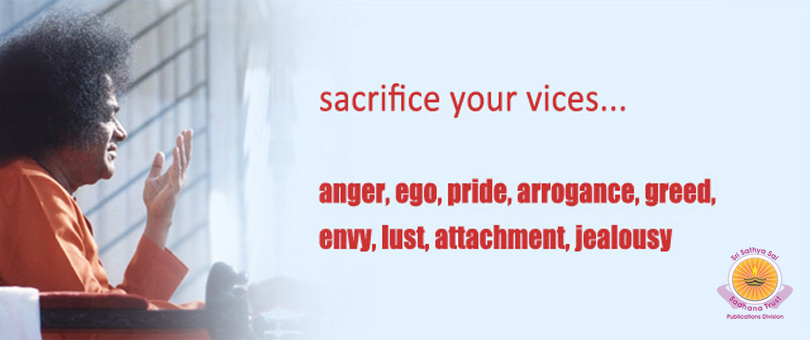
Once, even Prahlada said, “Since it is difficult to destroy egoism, man finds it easy to destroy this dumb animal as a substitute. Animal sacrifice is the manifestation of Tamoguna; it is the path of bondage. The sacrifice of the animal of egoism is Sathvic Yajna, in the Godward Path of Liberation.” – Baba
“I came to end the animal sacrifices, and if you do not stop making sacrifices, the wrath of God (the law of cause and effect) will not leave you alone.” – Jesus, (cited from Epiphanius, Panarion 3:16) “I desire mercy, not sacrifice.”(Mt. 9:13)
Sacrifice, so that you may be saved. You have to sacrifice – not a bleating sheep or a horse or a cow, but your animality, the bestial lust and greed, hate and malice. Sacrifice these and you earn the heaven of unflinching peace. - Baba, 23 November 1965
When a mundane mindless ritual is transcended,
Existence is enhanced to become spiritual…
As such, life is a voyage of the soul,
If this journey is limited to the body,
Will we ever reach our goal…?
None of the scriptures belonging to any religion teaches or supports violence and bloodshed on any other living being…for they all propagate harmony…a brotherhood…the Oneness of all life forms.
Existence is enhanced to become spiritual…
As such, life is a voyage of the soul,
If this journey is limited to the body,
Will we ever reach our goal…?
None of the scriptures belonging to any religion teaches or supports violence and bloodshed on any other living being…for they all propagate harmony…a brotherhood…the Oneness of all life forms.
Let us soak in the words of Beloved Bhagawan, “In the Divine Family of Lord Siva, there are four members, namely, Easwara, His Consort Parvati, and the two sons, Subramanya and Vinayaka. This is an ideal family. There is no difference of opinion whatsoever either between husband and wife or the two brothers. There is perfect accord and harmony in their family. Mother Parvati and Lord Parameswara wanted to set an example to the whole world in the matter of a most harmonious, perfect and loving relationship between a wife and husband and between brothers. If the unity among the family members suffers even to a small extent, the world will face the repercussions. Unity gives strength to the lives of the family members. Therefore, every family should strive for achieving unity and harmonious relationship among its members. Every family should strive to emulate the example of Lord Siva’s family. For example, Lord Siva’s vehicle is Nandi, the bull. Mother Parvati’s vehicle is Lion. The younger son, Subramanya’s vehicle is Peacock, whereas the elder son Vinayaka’s is the tiny Mouse. They move about the whole world on such strange vehicles which are antagonistic in nature but still lead a perfect and harmonious family life. The message of this holy Sivarathri is to live in unity and harmony with everyone.”
“Sometimes I am a dog, sometimes a pig, a cow, a cat and an ant, a fly and an aquatic creature. In such various forms do I move about in the world. Know that I like only him who sees Me in all the living beings. So give up the sense of differentiation. This is the way to worship Me.” - Shirdi Sai Baba
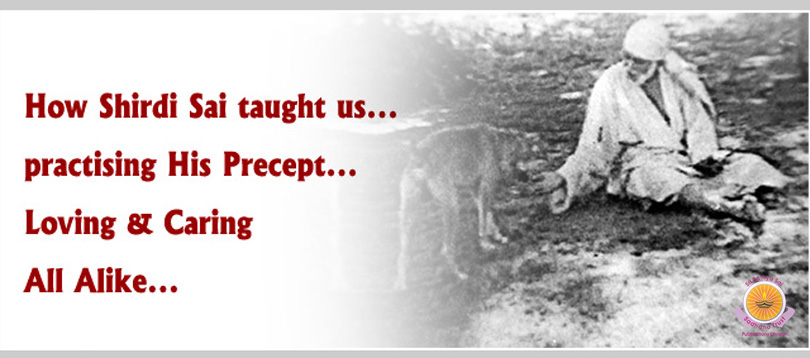
If at all we do feel the need to give up or sacrifice something…in fulfilment of a vow… or to gain certain benefits, then we could forgo, do without an article or food item we really like or else try our best to abstain from giving in to a bad habit that has a harmful effect or is a health hazard.
Once again Beloved Bhagawan explains this so simply – “The true secret of enjoyment lies in sacrifice. Sacrifice has also been declared to be the only means of achieving immortality. Giving up what is taken in is a law of life. It applies to breathing, food and other things. Likewise, the wealth which one acquires should also be given back to society. Wealth includes not only riches, but every other form of acquisition including knowledge, scholarship, and skills of various kinds. The knowledge you have acquired through education should be imparted to others. It is by such sharing that your education gets enriched and purposeful. If you do not impart the knowledge you possess, it becomes useless. This means that the more you give, the more you grow.”
What needs to be annihilated and offered at the sacrificial altar is demonic qualities…to be replaced by maîtri bhav or sadbhav…a kind of a kindred awakening. It is time to question ourselves…to introspect – just why have we come upon earth…been gifted a human life…along with so many other lifetimes should this life also pass us by without an answer…? Without compassion being able to liberate itself from caged thought processes and narrow minded egocentric clutches…to finally breathe free…we remain stagnant and stationary…in the middle of the cycle of transmigration.
For… unless compassion or karuna,
Does its loving arms raise and rear,
…how will we draw an elevated destiny near,
And our precious Lord endear…?
For… unless compassion or karuna,
Does its loving arms raise and rear,
…how will we draw an elevated destiny near,
And our precious Lord endear…?
“Man consumes as food many living beings, plants, eggs, fish, cattle, sheep, etc. These are born as human beings on account of this act of consumption. But, since they have not had the education which can reveal the God within, they vegetate or stay brutish, without appropriate ticket or passport for rising higher than the human status in which they have been hurriedly placed. Like most men, they roll along from womb to tomb, bond slaves to the senses and the ills that the bondage inevitably brings in its train.” – Baba
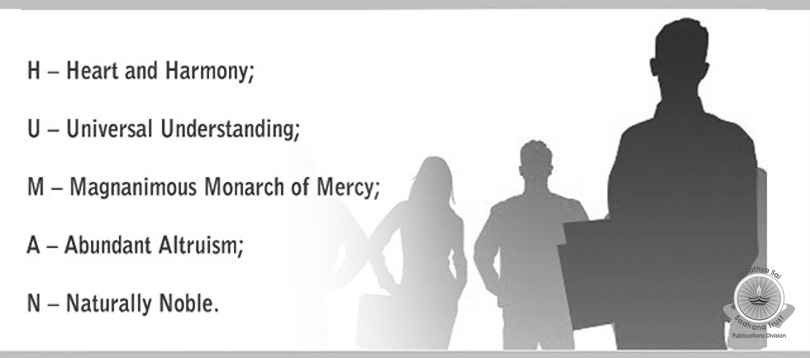
It is time to herald in a renaissance…to help recover, regenerate, restore and revive the glory of humanity…to tear apart the dreadful veil of shame, dishonor and disgrace that shrouds the human race for displaying appalling disregard and disrespect for the rest of creation…for banishing the very qualities that awarded it the title –‘Human’.
H – Heart and Harmony;
U – Universal Understanding;
M – Magnanimous Monarch of Mercy;
A – Abundant Altruism;
N – Naturally Noble.
H – Heart and Harmony;
U – Universal Understanding;
M – Magnanimous Monarch of Mercy;
A – Abundant Altruism;
N – Naturally Noble.
Human beings have sprung from the Heart of the Cosmic Being signifying Universal Understanding…the human heart is the home and seat of harmony, compassion and love and is bestowed with Magnanimous Mercy…humans are destined to be the Monarch of Mercy…quite amicably and affably, ceaselessly displaying Abundant Altruism…for humans are meant to be Naturally Noble.
From microbes to fish to plants…to insects to reptiles to animals…the journey culminates when the soul acquires a human form…hence, since we have experienced all these stages as our soul evolved, how can we turn a blind eye, pretend to be deaf and allow ourselves to overlook the afflictions of these forms…? When as human beings we disrespect the five human values, by not extending the qualities of Shanti, Prema and Ahimsa to all life forms…humanity continues to show a complete lack of growth and progress, leaning heavily towards regress.
Our sense of community and compassionate intelligence must be extended to all life forms, plants, animals, rocks, rivers, and human beings. This is the story of our past and it will be the story of our future. – Baba
Beloved Bhagawan’s life is His message…an example for us all to emulate…His words are eternally luminescent…full of harmony and accord that touches every atom in the Cosmos. So, let us enrich ourselves with these priceless pearls…be guided and enveloped by His pure selfless love…and emit it constantly to all life forms to draw in a peaceful coexistence…as He wants us to!
“When a devotee seeks with humility and purity to give seva and prema to My creatures who are in need of such selfless service and sublime love; when he considers all creatures as My children, as the blessed manifestations of My immanence, then, in fulfilment of My role as Sathya Sai, I descend to help, accompany and carry that Yogi. I am always near such a Yogi to guide him and to shower my love upon his life.”
“What about the animals? They need help too. My love embraces the animal kingdom too and so should yours. It should not be limited to humans alone.” – Baba
Sisters and Brothers, can we…should we…must we…deny our Beloved Lord any more what He wants of us…?
II Samasta Lokah Sukhino Bhavantu II
sourced:
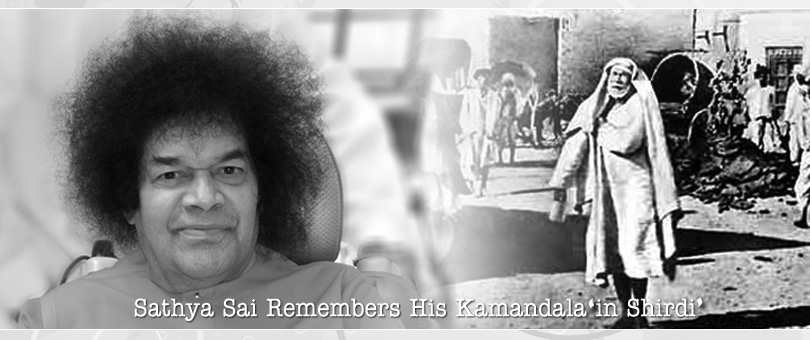
Sathya Sai Remembers His Kamandala ‘In Shirdi…’
Thursday, November 8th, 2012
Did Bhagawan in the old days ever describe any episode from the life of Shirdi Sai Baba? Though there are plenty of such references, directly from Bhagawan, throwing light into the Oneness of both the Avatars, sometimes He makes it unique and more interesting, involving some devotees, leaving an eternal impression in ‘His-Story,’ proving the Oneness.
The Raja of Chinjoli had been a great devotee of Sai Baba of Shirdi, who used to go and stay with Him. After the demise of the Raja and when Shirdi Baba was also no more, the Rani learned from two of her sisters living in Bangalore that there was in Puttaparthi a young Baba who called himself an incarnation of Sai Baba of Shirdi. These sisters, Rajamma and Sitamma, visited Puttaparthi frequently.
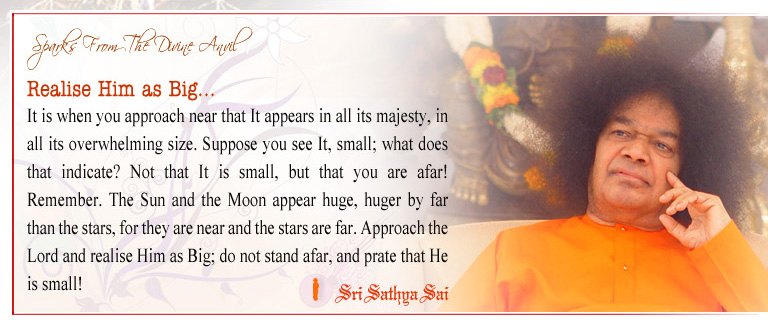
The Rani told her sisters that she did not believe that the young Swami could be Shirdi Baba reborn, and they left the topic. Then Puttaparthi Baba came to her in one of her dreams and said: “Why don’t you come and visit Me? I am Shirdi Baba born again and living in Puttaparthi.”
According to what these people told, the Rani shortly afterwards contacted one of her sisters in Bangalore and asked her what that Puttaparthi Baba looked like. And as her sister was describing Him, she exclaimed: ‘Yes, that is the very same Man that was in my dream.’ Till then she had not met Puttaparthi Baba and she did not have much knowledge of Him.’
The three sisters went to Puttaparthi together. As soon as the old Rani appeared, Baba said: ‘You have come at last. But what has happened to the mug I was carrying all the time? What about My kamandala? Have you brought it with you?’ The Rani asked Him: ‘What kamandala? Tell me.’ Swami replied: ‘Have you not kept it at such and such place in the palace? I used it so often. Every time I sat for a meal, water was only kept in that kamandala. Don’t you remember?’
The Rani was then taken aback for a minute for she remembered this, but was not fully convinced. She probably thought that her sisters might have told Him something.
Next Baba asked her” ‘What are you doing with My tonga (a small horse-driven cart)?’ Only Shirdi Baba used to ride in a certain tonga that was kept at the palace for His disposal when He visited Chinjoli. The Rani said that after Shirdi Baba’s ‘passing on’ they were not using the tonga. ‘Instead of keeping it idle in Chinjoli, why don’t you bring it to Puttaparthi?’ Swami suggested to her, and she had the cart brought to Puttaparthi.

sourced:
__._,_.___














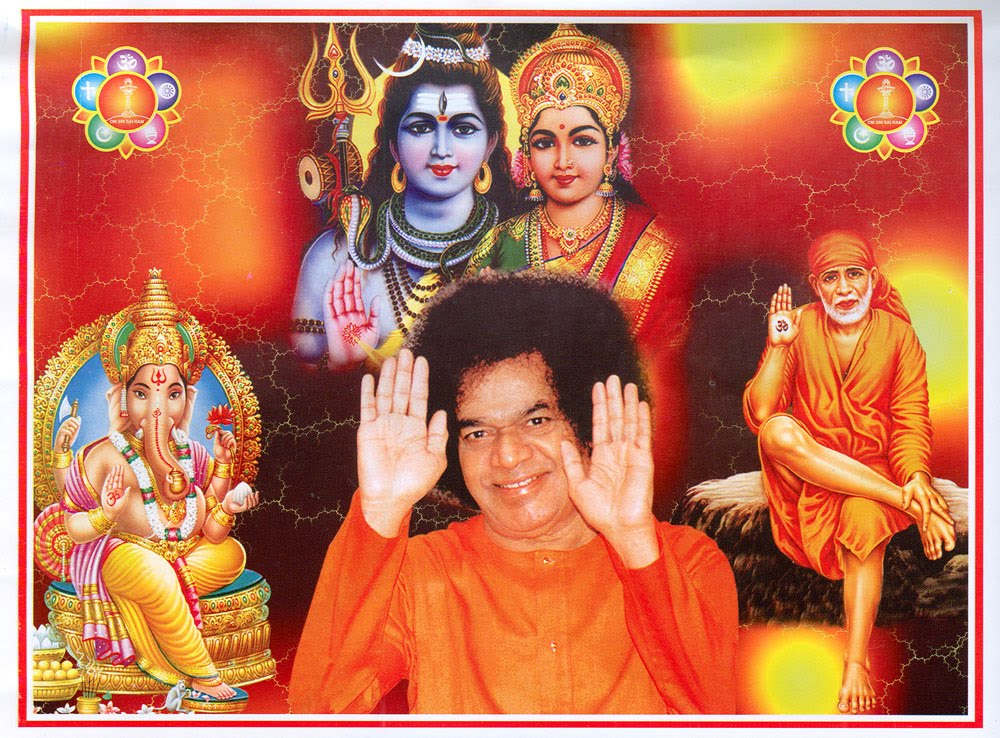






No hay comentarios :
Publicar un comentario